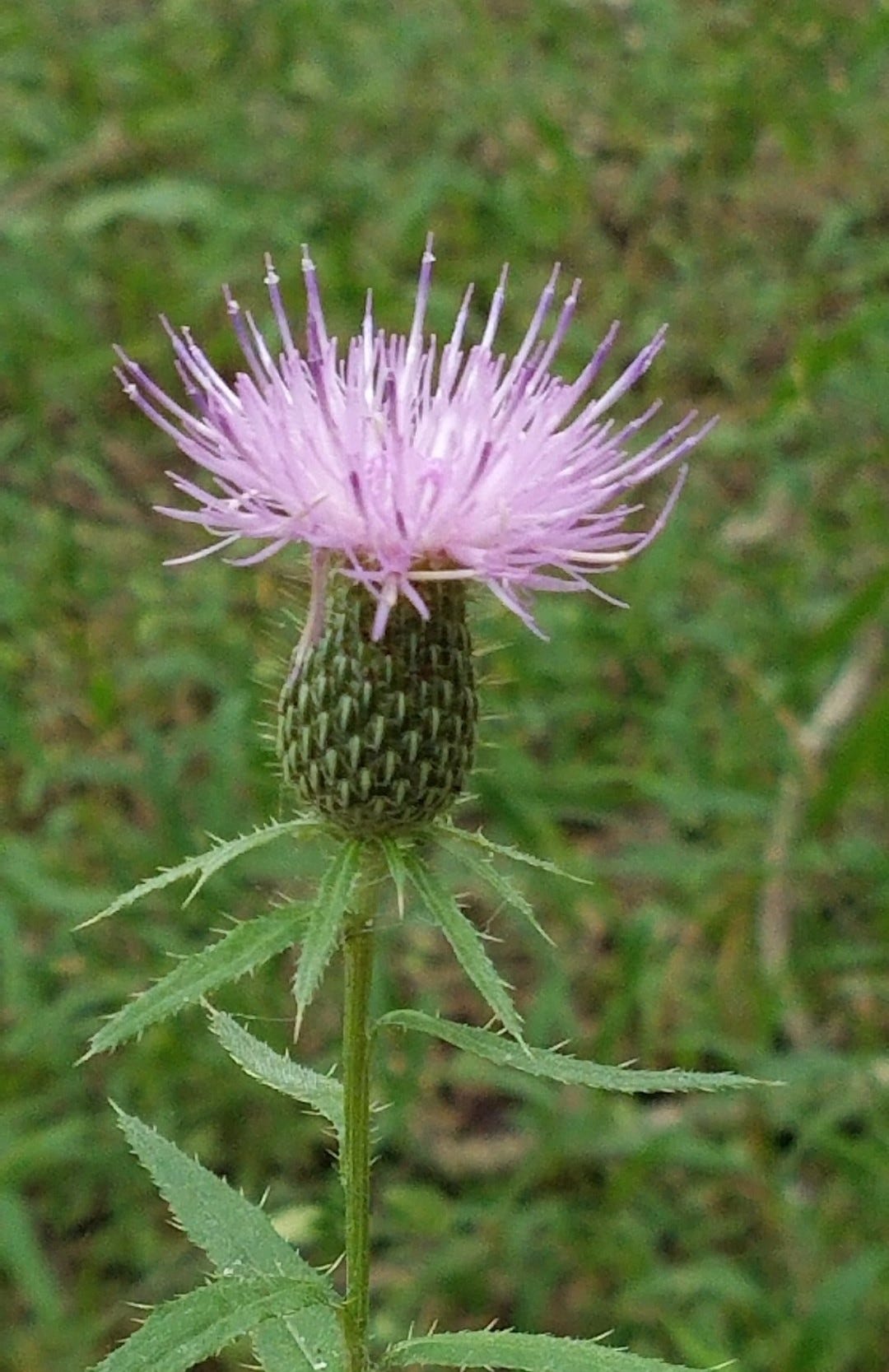Thorns
Prickles in Paradise
This post arrives on Easter Sunday. This past Friday is known as Good Friday. Easter is a day of joy and celebration; Good Friday is day of reflection and sorrow. Church decorations on Easter feature white lilies; two days earlier the dominant color was black. The cross at the front of my church was draped with black and adorned with a circle of thorns. In this issue I ponder the presence of thorns in places of sanctuary, what I call “prickles in paradise.”
Note about the image: This thistle was across road from our property, Mystery Acres. Notice the beauty of the flower and its many thorns.
My Mysterious Mind
Before my oldest daughter came home with her third baby, in a body recovering from surgery, I purchased some flowers to put in vases throughout her home. I considered several bouquets, daises, carnations, lilies, but I decided to decorate with baby roses. My daughter loves roses, and I liked the thought of giving her “baby” roses to celebrate her infant son.
One of her older sons, upon seeing the roses, commented about the presence of thorns. Funny. I hadn’t even thought about there being thorns on these lovely flowers. He, however, knew about thorns because of the roses already growing in the landscaping around their home. As I arranged the roses into three different vases so I could put them in different rooms, I discovered the thorns.
So, I’ve been thinking about those baby roses and their thorns. I bought the flowers in honor of a new baby, an amazingly perfect little boy. I am captivated by his miraculous beauty, somewhat like being in awe of gorgeous roses. But there are thorns, or at least there will be. For now, his thorniness is limited to disgusting diapers or being fussy when his parents are trying to sleep. In the years to come, other thorny aspects will appear. There will be those frustrating toddler years when “no” becomes his favorite word. That opposition will reappear in the teen years as he pushes against his parents.
Are the roses any less amazing because they have thorns? Is this incredible tiny person less incredible because he, too, will have thorns? His arrival is a bit of heaven come to earth. Holding him is to know paradise. And there are thorns, even in paradise.
Message from Mystery Acres
In the years of searching for a piece of land, one of the most beautiful places bordered a year-round creek. The spot was hard to access, nestled behind another property, tucked into a hidden patch of heaven. There was one little problem; or should I say thousands of tiny, prickly problems? Most of this secret gem was covered with thorny trees. And these weren’t the adorable give-you-a-little-scratch-as-passed-by kind of thorns. These nasty protrusions were an inch or longer, sufficient to cause serious injury. Why did paradise have such awful thorns?
Mystery Acres, despite decades of waiting for us, had no such thorn trees. There is the intermittent patch of briar or wild rose, but dangerous nastiness is missing. Unless, of course, you include ticks. Those unavoidable occupants of the woods are present, even in my precious, mysterious forest! Why does paradise have such horrible creatures?
And there’s something else dangerous in my forest: poison ivy. Those of you who have pictured a magical, trouble-free patch of heaven might be deeply disappointed to learn that my paradise isn’t perfect. If it were perfect, there’d be no thorns, no ticks, and no poison ivy. Alas, we have two of the three.
Fortunately, I can avoid the prickly areas, spray my body for ticks, and have learned to recognize and steer clear of poison ivy. Deep in my being, I long for a sanctuary without such evasive maneuvers needed. In my heart of hearts, I yearn for a place without prickles and dangers. Even in my almost-perfect paradise my desire is only partially met. Plus, as I have written about previously, being in the forest requires preparation and work. I feel so free in the woods, but being there isn’t free.
The message of Mystery Acres is that sanctuary has thorns, metaphorical and literal. We long for sanctuary from deep inside, but we will only enjoy partially-perfect paradise. Mystery Acres is a sanctuary, a place of respite and retreat, and that place is home to poison, prickles, and ticks. That’s the best heaven on earth available.
Ancient Mystery’s Voice
“They twisted together a crown of thorns and set it on Jesus’ head.” (See Matthew 27:29; Mark 15:17; and John 19:2)
The Bible is organized into two main parts, the Old Testament (before Jesus) and the New Testament (after Jesus). Both refer to thorns in multiple places. Curiously, the Old Testament is more “full” of thorns than the New Testament. There are 30 verses about thorns in the books written before Jesus, and only 11 in the books written after. Furthermore, there are 18 different Hebrew words used in the Old Testament that are translated as thorns, and only 3 in the Greek used in the New Testament.
The first mention of “thorns” is in the first book, called Genesis. Here God is describing the curse on the earth because of the disobedience of the first humans, i.e., Adam and Eve. The once-perfect creation of plants will now grow “thorns and thistles.” [I suspect this is also when ticks were created.] Then, the next books of the Old Testament mention numerous types of thorny plants. Some are thorny trees, others are bushy briars, and there are thistles. Much of this variety is lost in the translation of these various thorny plants.
In the first four books of the New Testament, collectively called the Gospels, the life of Jesus is detailed by early believers. In three of these Gospels, a story, known as a parable, told by Jesus, is about a farmer sowing seeds. Some of the seed fell among thorns, which grew up and choked the growth of the farmer’s seeds. Jesus explained the meaning of the seeds as being the Word of God and the thorns as the worries of life and the deceitfulness of wealth. The growth of those who believe in Jesus is limited when worries and focus on money prevail. The perfect sanctuary of belief is in danger because of thorny weed-thoughts and desires.
Three of the Gospels include a thorny detail in their description of Jesus’ crucifixion. Roman soldiers made a “crown of thorns” and put it on Jesus’ head. The type of thorny plant used is akanthos, probably now known as pyracantha, or firethorn. The thorns can easily pierce the skin and cause inflammation and intense pain.
What is the connection between the arrival of thorns in paradise, the thorns choking the faith of believers, and the crown made of thorns? All represent the destructive power of disobedience, what the Bible calls “sin.” Perfection is wrecked by rebellion, and all of creation is under the curse of thorns. That “kingdom of thorns” is represented by the crown on Jesus, the King. He took that kingdom with Him, defeating it through His death. He was perfect and thorn-free but He wore the crown of thorns as a symbol of the curse He was wearing.
It's a little confusing because there are still thorns, literal and metaphorical. Creation is still thorny and human behavior remains rebellious. Believers still struggle against the worries of this life and the temptation of money solving their problems. We all long for a paradise free of thorns and troubles. The victory over thorns is complete, and yet the full experience of that victory is delayed.
Living in Mystery
The last few days have been full of roses, complete with thorns. My heart has been pricked multiple times as my path went through some beautiful but painful briars. Several coworkers from my “outgoing role” expressed their sadness at my upcoming departure. This brings joy to my heart, but also suffering. At the same time, I have been looking at the path ahead, the journey into my new role, and I can see more clearly the thorny places I might encounter there. There is no path without prickly places.
How can I, and you, live joyously in the reality that any earthly version of paradise will include thorns? First, we can face the facts: there is a thorn-free heaven, but we are not there yet. Even the best parts of our current versions of paradise will have prickly parts. Though we long for a life of perfect sanctuary, it doesn’t exist, or, if we find it, the perfect moments are just that: moments. Remember that awesome dog we adopted a couple of months ago, Oscar? He has destroyed three pairs of sandals, one belt, and a DVD case. Should we get rid of him? Or should we adjust our lives and expectations?
Living in the awareness of thorns, even in paradise, also brings a caution: Don’t race ahead into tomorrow until you get there. This is something I am prone to do. I look ahead and try to plot a course through anticipated problems. Honestly, this usually just brings prickles into my path today, which, incidentally, has enough prickles of its own. It’s wise to prepare for tomorrow to the extent we can do so without ruining today. We can, however, only see today’s path clearly enough to minimize walking in the thorny places.
Walking with care in today’s path, with its share of prickles, will not prevent getting hurt by thorns, briars, and thistles. Sometimes the pain in today’s path is unavoidable. It’s OK to be sad, mad, or scared about prickly things in your path. Two words of advice: try not to get stuck there and make time to heal from any injuries. Like roses, even the best parts of life can have thorns. Don’t live in denial of the pain these thorns are causing you; instead seek places of healing so you can recover. Where are your places of nearly-perfect-sanctuary? When life’s prickles hurt you, make time to go there.
Living in the mystery of prickles in paradise is to celebrate the roses while acknowledging their thorns. Even the most amazing places, relationships, and experiences will have painful aspects. While walking carefully through today’s path, try not to run ahead into tomorrow’s briar patches. And, when something today causes you pain, seek places of healing to recover.
Connecting with Mystery
Dear Lord of All Mystery, thank you for creating beautiful places along the path of my life. Help me to find joy in the roses you provide, even though there are thorns. I confess to running ahead into tomorrow’s briars; help me instead to trust you with the steps I take today. When life’s prickles cause me pain, lead me to places of healing. Amen.
Notes from Dr. Mac
If you want to do your own investigation of any of the scriptures I use, I suggest you go to Bible Gateway. This free online version of the Bible allows a search of words or phrases in various translations.
You can find previous posts and podcasts in my ARCHIVE and organized compilations in the My “Books” section.
Do you have thoughts to share? Please leave a comment below or through the Substack App, or email me privately at Dear Dr. Mac. I love to hear from you!


